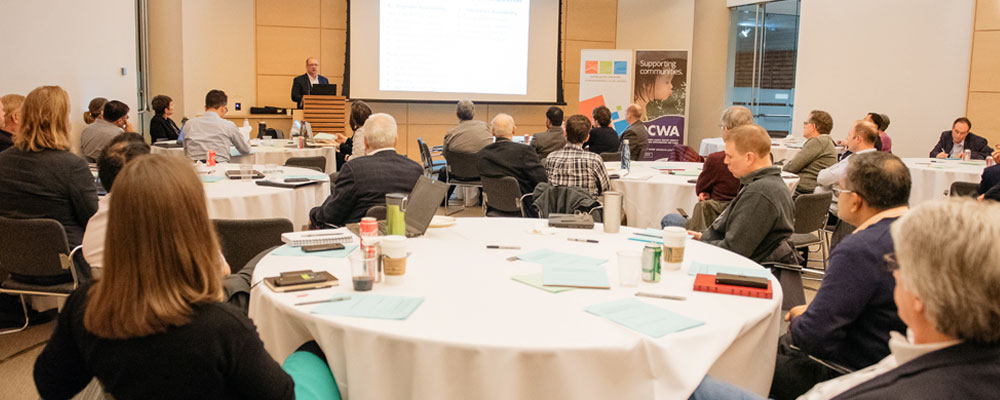The third Getting to Net Zero Energy event was hosted by the Ontario Water Consortium in February of 2020. This event continued the momentum toward getting five municipal wastewater treatment facilities converted to net zero energy by focusing on anaerobic codigestion to produce biogas. The biogas produced through anaerobic digestion of comingled food waste, organic waste, and sewage biosolids can be used to produced renewable electricity, or purified to produce renewable natural gas (RNG).
In early 2020, more than 60 participants and experts from diverse stakeholder groups gathered in Toronto to discuss transitioning existing wastewater treatment plants (WWTPs) to net zero energy facilities, also known as water resource recovery facilities (WRRFs). This day-long event was hosted by the Ontario Water Consortium (OWC) in partnership with the Ontario Clean Water Agency (OCWA) as part of their vision to lead Ontario in the development and adoption of water technologies and processes that will solve water challenges both locally and globally. The OWC is a collection of educational institutions working to advance the commercialization of innovative water technologies. They facilitate real-world testing, introducing companies to academic expertise, and funding industry-led collaborative projects to develop and demonstrate new products and services. The Province of Ontario has funded the OWC to support research, events, and engagement to drive adoption of innovative technologies, particularly for “net zero energy” wastewater treatment.
This has sparked a sequence of “Getting to Net Zero” events. These conversations are important as municipalities spend a large portion of their energy consumption on water and wastewater systems and the trend is moving towards increasing energy costs. The Environmental Commissioner of Ontario has noted, “Municipal water and wastewater systems are usually a municipal government’s largest energy users, consuming, on average, 38% of the energy use. The first Getting to Net Zero was a leadership forum-style event in 2017, attended by municipal leaders, water technology companies, and academic experts. In this event, participants came together to discuss a radical shift in Ontario: creating five “net zero energy” wastewater facilities in the next 5 years.
City of Stratford was an important case study for the day’s discussion, profiling its plans to advance a Net Zero Energy facility. This facility would accept food waste and organic waste known as source separated organics (SSO) for processing along with biosolids in the anaerobic digester at its wastewater treatment plant, a process known as codigestion. Through this process, wastewater treatment plants produce renewable energy, thereby turning them into the more appropriately named Water Resource Recovery Facilities. In February of 2020, OWC and OCWA hosted their third Getting to Net Zero Energy Wastewater event. The purpose of this event was to build upon previous conversations and continue the momentum toward getting five municipal wastewater treatment facilities converted to WRRFs by 2022, specifically focusing on opportunities for anaerobic codigestion to produce biogas at these facilities.
Azura’s David Ellis was invited to share his decades of experience in the anaerobic digestion industry. Along with Phil Sidhwa, President of Orgatech Energy and consultant Don Hoekstra, they discussed planning for long-term feedstock supply and disposition. David’s presentation covered the competitive forces at play in the market for raw feedstock. Because the anaerobic digester community consists of both large and small anaerobic digester systems, there is elasticity in the demand for feedstock. As each new major digester project is commissioned, there is the potential for price competition and a redistribution of feedstocks.
The event outcomes of this workshop have been compiled into a Summary of Recommendations as well as a Handbook of Codigestion Projects at Municipal Wastewater Treatment Facilities.
Additional information from the event can be found on the Ontario Water Consortium event page Getting to Net Zero Energy – Ontario Water Consortium.
Get Insights from the Bioprocess Experts Right to Your inbox
Sign up to the Discover Digesters Newsletter to access Azura’s best practices, field-tested advice, and insights into the anaerobic digestion & industrial wastewater treatment industries.
By submitting this form, you are consenting to receive marketing emails from: Azura Associates. You can revoke your consent to receive emails at any time by using the SafeUnsubscribe® link, found at the bottom of every email. Emails are serviced by Constant Contact.

